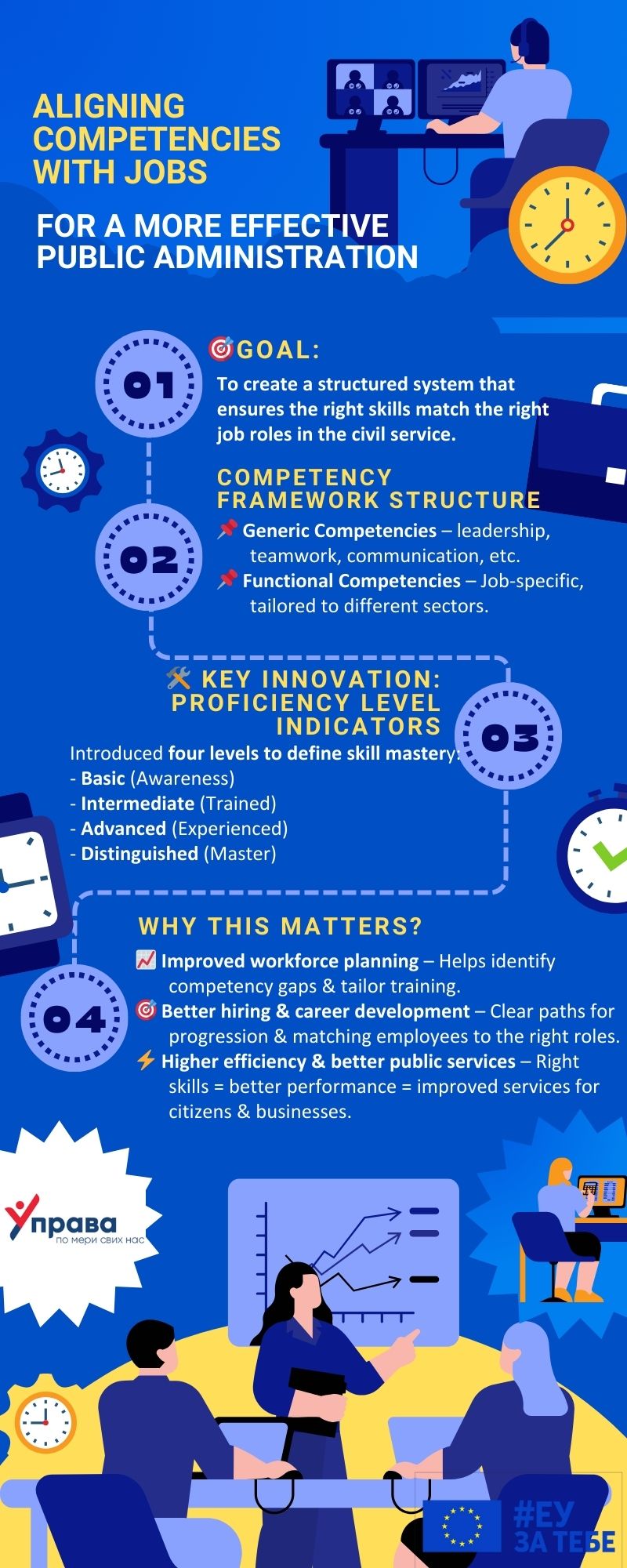Advancing the competency framework further introduces a modernized approach to HRM, strengthening skills for better governance in Serbia’s civil service.
The Ministry of Public Administration and Local Self-Government (MPALSG) and the Human Resource Management Service (HRMS) have initiated a revision of the competency framework for Republic of Serbia’s civil service, marking a significant step forward in improving human resource management (HRM). With the support of the EU-funded project "Integrated Human Resources Management in Public Administration ofthe Republic of Serbia", this initiative builds upon five years of experience with the existing framework. The proposals for enhancement competency framework, based on lessons learned from years of implementation, introduces a modernised model aligned with European best practices.
The enhancement of the competency framework was carried out through the joint efforts of MPALSG, HRMS, and the Project. The project team has developed proposals for enhancement of the current competency framework. The revised model introduces:
- Generic Competencies: a set of knowledge, skills, and abilities that an individual should possess, that are applicable across all civil servant roles, encompassing competencies focusing on interpersonal relations, quality of services delivery and leadership.
- Functional Competencies: These are job-specific skills and abilities tailored and required for the particular working areas in state administration, such as development, implementation, monitoring, and evaluation of public policies, human resource management, finance, accounting and public procurement, IT, internal audit, etc.
One of the key innovation in the revised framework is application of Proficiency Level Indicators - the introduction of four proficiency levels (Basic, Intermediate, Advanced, and Distinguished) within functional competencies. This approach ensures a structured application of competencies by aligning competency requirements to job roles at different levels, thus bringing greater clarity to what skills and abilities are needed for career advancement.
VALIDATION THROUGH FOCUS GROUPS
The validation of the proposed competency framework for the HRM work area was carried out through focus groups with civil servants working in these roles. Following the validation of typical job roles in the work area during the first focus group, the second focus group confirmed the competencies, key indicators, and proficiency levels for this work area. Two focus group that were held in January and February 2025, brought together more than 40 participants - project beneficiaries’ (MPALSG and HRMS) representatives and HR units’ representatives from various state administration bodies.
The feedback from these focus groups was clearly positive – it was confirmed that the presented HRM job area, the relevant competencies, and their proficiency levels logically structured, more precisely and clearly defined, and aligned with the actual tasks performed in state administration. Participants emphasized that the proposals in the field of HRM job roles provide greater clarity on competency development for civil servants working within the HRM sector and a better understanding of the role of HR units.
WHY THE ENHANCEMENT OF THE COMPETENCY FRAMEWORK MATTERS?
A well-structured competency framework is essential for ensuring that civil servants have the right skills and knowledge to perform their jobs effectively. The Project proposals on the competency framework enhancement introduces a clearer, more structured approach to defining and assessing competencies, from operational and expert to managerial roles.
The proposal of the enhanced competency framework introduces clear proficiency levels, ensuring employees to understand career expectations. It supports better workforce planning by identifying skill gaps and guiding targeted training. With a more structured approach, hiring and career development become more effective, ensuring the right people are in the right positions. Ultimately, this enhances performance and improves public services, benefiting both citizens and businesses.
NEXT STEPS: FURTHER VALIDATION AND EXPANSION
Further focus groups are planned to externally validate the generic competencies, ensuring their applicability across all state administration bodies.
In the focus groups on the HRM job area, the participants very precisely expressed that an ID for the HRM job area had been created within the Project. said Edvardas Žukauskas, Project Team Leader. It means greater clarity for HRM units regarding their role and on the necessary competencies that need to be further developed to fulfil this effectively. I am pleased that our Project has contributed in this way to the further development of the HRM area in the Serbian public administration.”
With continued support from the European Union, Serbia is strengthening HRM practices and aligning with European best practices, ensuring long-term improvements in public administration.
